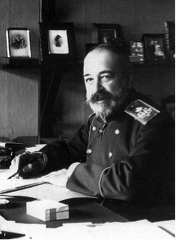

|
Why was there a Revolution in 1905?  Prime Minister Sviatopolk-Mirksy The Russian revolution did not start with the peasantry or the industrial working class. It began with the liberal opposition movement of the middle classes and nobility whose demands for political reform in 1903-4 opened up a revolutionary front against the autocracy. The vanguard of this liberal movement was the Union of Liberation, an underground organization established in St Petersburg, whose programme called for the ending of autocracy, a constitutional form of government, self-determination for the nationalities of the empire, as well as economic and social reforms. The Union developed against the backdrop of the Russo-Japanese War (1904-5) which turned public opinion against the government. The liberal opposition rallied behind the campaign for a national zemstvo assembly. Shocked by Plehve's murder, the tsar had intended to replace him with another hardliner, but bad news from the Front and the strength of the opposition at home persuaded him to appoint a liberal, Prince Sviatopolk-Mirsky, who called himself a 'zemstvo man'. Encouraged by Mirsky's appointment, in November 1904 the liberals convened a zemstvo congress in St Petersburg which passed a ten-point resolution calling for political reforms, including a legislative parliament. Civil society was politicized. Provincial zemstvos and town councils passed resolutions in support of the congress. Calls for political reform were also made by industrial, academic, cultural and professional organizations. The Union of Liberation organized a nationwide series of banquets (like those in France in 1847-48) attended by the zemstvos' supporters at which toasts were drunk to freedom and a constitution. Mirsky presented the Tsar with a carefully worded digest of the zemstvo assembly's resolution in the hope of winning him over to a programme of moderate reform. But even this was too much for the Tsar, who ruled out any talk of political reform as 'harmful to the people whom God has entrusted to me.' His own Imperial Manifesto said nothing on the all-important subject of a parliamentary body. |
© 2014 Orlando Figes | All Rights Reserved